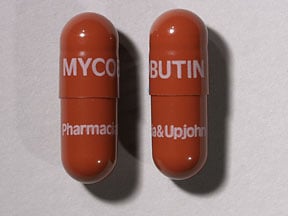
Rifabutin Coupons & Savings Card – Discount Prices from $114.81
Generic for: Mycobutin
My prescription
Edit
150MG, Rifabutin (28 Capsules)
Select pharmacy

CVS
$182.23
COUPON PRICE
Walgreens
$114.81
COUPON PRICE
Albertsons
$274.95
COUPON PRICE
Walmart
$295.35
COUPON PRICERifabutin savings card
Show this card to your pharmacist
Walgreens
$114.81
BIN
ID
PCN
GRP
011867
LH039842E1
HT
LABH001
Powered by
More prescriptions for tuberculosis
More prescriptions for tuberculosis
Price history for Mycobutin (brand) & Rifabutin (generic)
28 Capsules, 150MG
Average retail price for Mycobutin
Average retail price for Rifabutin
Average SaveHealth price for Rifabutin
Our price history data is based on aggregated prescription data collected from participating pharmacies in America. Our prescription data updates daily to reflect the latest price changes. If you notice a missing data point, it means there wasn't sufficient data available to generate a monetary value for that date.
We analyzed Rifabutin prices for (150MG, 28 Capsules) over the last 12 months. The average retail price was $984.36, while the average price using the SaveHealth discount card was $244.64. That's a savings of approximately 75.15% when using our Rifabutin coupon.
Compared to the generic version, Mycobutin had an average price of $2435.07 over the same time period. With the SaveHealth savings card, Rifabutin is 89.95% cheaper on average than Mycobutin.
*Retail prices are based on pharmacy claims data, and may not be accurate when we don't have enough claims.
Rifabutin dosage forms
Dosage Quantity Price from Per unit 150MG 28 Capsules $182.23 $6.51 150MG 60 Capsules $369.58 $6.16 150MG 100 Capsules $611.77 $6.12
| Dosage | Quantity | Price from | Per unit |
|---|---|---|---|
| 150MG | 28 Capsules | $182.23 | $6.51 |
| 150MG | 60 Capsules | $369.58 | $6.16 |
| 150MG | 100 Capsules | $611.77 | $6.12 |
